

Tao Te Ching
Search Sages
Enter all or part of an sage's name or biography in the fields below, then press tab or enter to filter the list of Authors. Click the headings Name or Biography to sort by that column. Diacritics are ignored when searching.
Click on the author's name to go to their page.
| Author Name | Biography |
|---|---|
| Guru Hargobind | 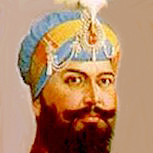 Guru Hargobind Guru HargobindFounder of Kiratpur, builder of the Akal Takht, liberator of Hargobindpur, sixth and longest reigning Sikh guru, Guru Hargobind introduced weapons and martial arts into the Sikh tradition and in an effort to defend freedom of religion and defend against Islamic persecution, became the first Sikh Guru to engage in warfare. Persecuted, imprisoned and poisoned; he overcame obstacles, defeated superior Moghul forces, and united the practical and the spiritual, defense and compassion helping to establish the independence of Sikhs as their own political and religious force. |
| Guru Nanak Gurmukhi | 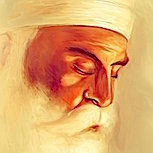 Guru Nanak Gurmukhi Guru Nanak Gurmukhi“One of the greatest religious innovators of all time” and founder of Sikhism – one of the world’s newest religions; Guru Nanak traveled widely learning and teaching in the non-thought lineage of non-duality beyond concepts of self and other. He spread a message of replacing revenge and anger with peace and kindness; of each person’s direct access to the highest realizations without need of priest or ritual; of the inseparability of spiritual and everyday life in the world. He set up a political-social-spiritual system based on goodness, virtue, and equality: a much-needed message for our modern world. |
| Guru Ram Das | 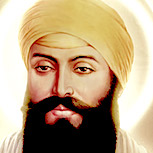 Guru Ram Das Guru Ram DasLeading a revolt against superstition, Guru Ram Das emphasized egocentrism as our main problem and - along with quiet meditation - actively helping others as the main remedy. He described the reason for his long beard as a way of dusting off the feet of others. He built the Sikhs’ holiest center, Amritsar, wrote a hymn still used in standard Sikh weddings, and emphasized the importance of deeds over caste, compassion over materialism. He exposed the hypocrisy of prejudice, misogyny, and cultural chauvinism disguised as religion and exemplified the way of direct realization beyond concept and form. |
| Guru Tegh Bahadur | 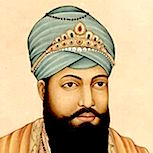 Guru Tegh Bahadur Guru Tegh BahadurPublicly beheaded by the Mughal Emperor after being tortured for many weeks because of refusing to convert to Islam, Tegh Bahadur’s father predicted when he was born, “He shall protect the weak and relieve their distress.” He sacrificed himself to protect the Hindus and Sikhs of Kashmir who were being persecuted and forced to convert to Islam and this event further condensed the Sikh community’s resolve to resist Muslim rule. He became a symbol for religious freedom and the protection of human rights while turning the tide of history for Sikhs, India and the Panjab setting the stage for a government based on social justice without prejudice based on color, caste, or religion. |
| Gwanggaeto the Great | 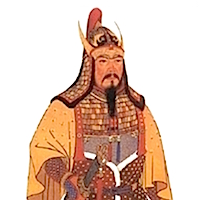 Gwanggaeto the Great Gwanggaeto the GreatAn early, conquering ruler, Gwanggaeto expanded Korea’s territory to it’s historically largest extent, established his country as one of the greatest in East Asia on equal standing with China, and began a golden age of Korean culture. His reign extended into Inner Mongolia, Western Manchuria, and the Russian seaside provinces. Considered the greatest Korean hero and today still seen as a nationalistic symbol, he established his own era name of “Eternal Rejoicing” and inaugurated a government for his son, Jangsu who ruled for 79 years, the longest reign in all of East Asian history. Debate between Korean and Japanese scholars over the meaning of a text inscribed on a 6.39 meter monument to Gwanggaeto remains in contention today. |
| H. G. Wells | 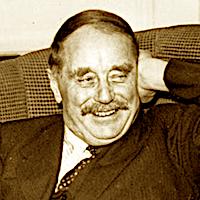 H. G. Wells H. G. WellsA father of science fiction and One World Government apostle Social critic, journalist, prophetic futurist, and “A father of science fiction”; Wells—a prolific writer of novels, social commentary, and history—wrote more than 100 books. He envisioned the World Wide Web, nuclear weapons, satellite television, mass surveillance, and many other un-invented but now common technologies. He also explored both the positive an negative ways of integrating them into civilization. An outspoken socialist and proponent of equality and human rights, Wells had a strong influence on his friend Winston Churchill who peppered his speeches with Wells-quotes. Nominated for the Nobel Prize in Literature four times, his influence extended to almost all modern science fiction writers. A strong believer in the need for us to become citizens of the world under a One World Government, he helped create the UN-adopted Universal Declaration of Human Rights. He worked hard on the creation of the League of Nations but disappointment with its effectiveness and inability of politicians to elevate the common-world good over their personal benefits led to his conjecture that it might be better for another species to replace humanity. |
| Hadrian | 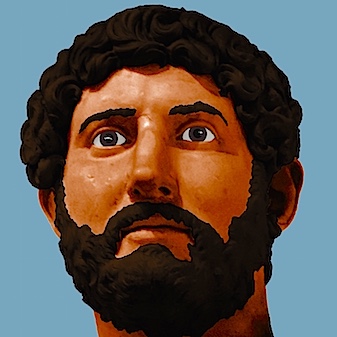 Hadrian HadrianPillar of the golden age of Rome, Hadrian hated war and loved philosophy, literature, and the arts. He prevented corruption, favored the poor over the rich, and governed this empire better than any time before or since. Gibbon called this period of time “the only period in history in which the happiness of a great people was the sole object of government.” He carefully listened to complaints and suggestions later securing the reigns of his successors, Titus and Marcus Aurelius - administrations called by Will Durant “among the most beneficent in history.” He rebuilt the Pantheon in a new style copied by St. Peter’s Basilica and the U.S. Capitol in Washington, D.C. |
| Hafiz | 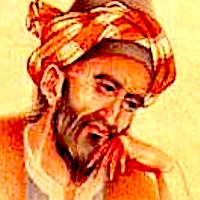 Hafiz HafizInspiring friend to the true and free human spirit Mystic poet, “tongue of the invisible,” living oracle, “a poet for poets,” one of the world’s best spiritual friends and guides; Hafiz wrote poems that dissolve the walls separating people from each other, from nature, and from sacred awareness. For centuries readers in the Persian world have used him as a kind of I Ching or astrology to find practical, personal, and wise advice for the quandaries of daily life. Even Queen Victoria is rumored to have used his poems in this way. Although a Sufi in the Islamic traditions, Hafiz obviously goes far beyond and kind of sectarian fixation and exposes a true realization of universal truth, the perennial philosophy, and authentic, sacred-world living. |
| Hakuin Ekaku |  Hakuin Ekaku Hakuin EkakuA monk at just 15, Hakuin soon became dissatisfied with the teachings available, left the monastery, began wandering and met a Taoist hermit, Hakuyu. One of the most influential figures in the Zen tradition, Hakuin included teachings from many different traditions and brought these to the illiterate. Although not beginning to paint until almost 60, he’s now recognized as one of the greatest Zen painters with works displayed in some of the world's leading museums. In a famous story, when unjustly accused of fathering a child and also when the mother later confessed to the lie and the child was taken away from him, his only comment was “Is that so?” |
| Hammurabi | 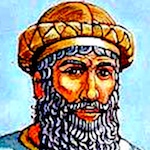 Hammurabi HammurabiFather to his people and example of good government to us all In a primitive time and place of barbaric chaos, Hammurabi not only established order, prosperity, and fairness for his own country but set an example and structure for governments of his time, throughout history and all the way to modern times. He used wisdom and irrigation to make Babylon one of the richest cities history had known and then used his power to become “a real father to his people” giving them justice, infrastructure, a higher culture, and a legal system that prevented abuse of power, oppression of the weak by the strong, marital tyranny, protection of orphans and widows, and laws we still use today like “innocent until proven guilty.” |
| Hán Fēi |  Hán Fēi Hán Fēi Though something like a Chinese Machiavelli and somewhat biased toward a “Legalist” point of view, Han Fei wrote the first commentary on the Tao Te Ching. His political philosophy helped China’s first emperor, Qin Shi Huang gain power and although he was killed by Qin political intrigues and vilified after the fall of the Qin Dynasty, he became an immense influence on every Chinese dynasty including the present. A collection of aphorisms and political principles, his philosophy teaches rulers how to avoid corruption and nepotism, improve laws, and beneficially guide public opinion. |
| Han Shan |  Han Shan Han ShanClaimed by Buddhists as a Buddhist, by Taoists as a Taoist; Han Shan poked fun at both and living beyond any narrow categories like these, through his poems communicated a universal wisdom and truth. Not attached or attracted to honor and gain, he laughed at offered high positions and wealth. The favorite poet of everyone from Wang Anshi (1021-1086), one of China’s most famous prime ministers to Jack Kerouac who in 1958 dedicated his book Dharma Bums to him, Han Shan’s poems express complete spontaneity, total indifference to praise and blame, and continual realization of pure consciousness in the simple, ordinary details of life. |
| Hannah Arendt | 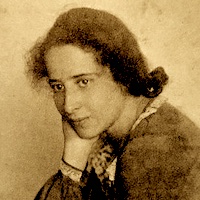 Hannah Arendt Hannah ArendtFearless researcher into the darker reaches of the human psyche An influential philosopher, historian, and deep thinker; Arendt developed some of the most important political theories of the 20th century. An early, 1932 critic of the Nazi Party; she was arrested the year Hitler came into power, imprisoned, escaped, and her German citizenship was taken away in 1937. Arrested again in France, she escaped again and eventually came to the USA in 1941 Influenced by and a major influence on Martin Heidegger, she studied under him and had a four-year affair when she was 17 and he 35. She also studied with Karl Jaspers who became her doctorate degree supervisor. Her research and thinking focused on the formation of nationalistic, fascist, and totalitarian systems and how ordinary people become controlled into following them. She applied these theories in covering the trial of Adolf Eichmann for the New Yorker in 1961 which created one of the biggest controversies of the era. Instead of accepting the common depiction of Eichmann as an evil monster, she described him as a victim of an unwillingness to think clearly and instead mindlessly take orders. This refuted the dualistic understandings and accepted ideas of the time about unquestioning obedience to superiors. These were some of the most relevant issues in preventing more totalitarian take-overs but brought about intense criticism of her from many sides. Perhaps Jung's ideas about projection were at play here: people not seeing or admitting the pulls toward this kind of evil in themselves and projecting it out completely on Eichmann whom she described as only "banal," ordinary, fixated on the duty of obedience, and abandoning critical thinking — qualities possibly shared too closely by the critics. |
| Harold Bloom | 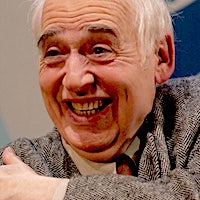 Harold Bloom Harold BloomLiterary critic, author, and Yale Professor of Humanities |
| Harriet Tubman | 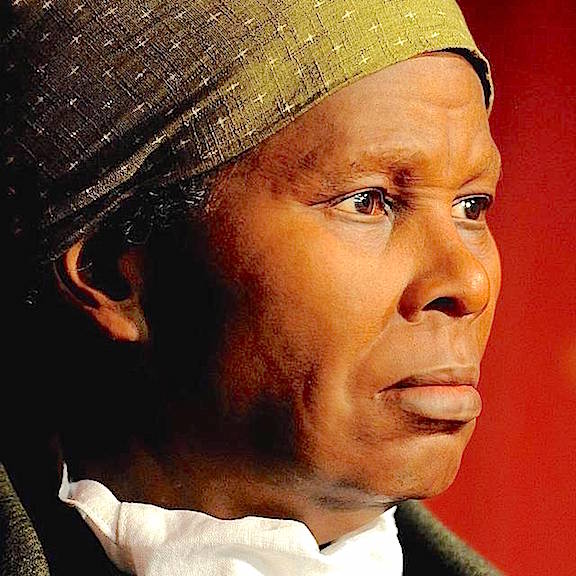 Harriet Tubman Harriet TubmanBeaten, whipped, and escaped slave; US armed army spy, nurse and scout during the Civil War; and soon to replace on the $20 bill slave-owning Andrew Jackson who illegally broke treaties with native Americans and refused to support Supreme Court rulings in their favor; Tubman was the first woman to lead an armed war campaign (that freed 700+ slaves), used the Underground Railroad to secretly rescue over 70 slave families, found work for the newly freed slaves, and became an important part of the women's suffrage movement. A devout Christian considered by many a saint, although living in constant poverty, she never stopped her humanitarian work and is now a shining symbol for courage and freedom. |
| Harry S. Truman | 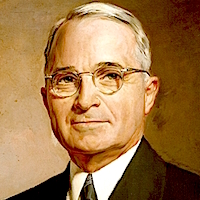 Harry S. Truman Harry S. Truman |
| Haruki Murakami | 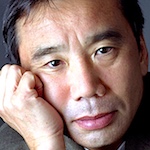 Haruki Murakami Haruki MurakamiA “global” writer going beyond his time and culture to explore universal themes, Murakami takes his characters and readers into an inner dreamscape where they together look into the beyond thought world of imagery, perception, and consciousness. Grandson of a Buddhist priest and an Osaka merchant, he became both the most experimental and most popular Japanese novelist translated into English. Called a “voice of his generation,” his books create an allegorical world of magical realism and convey an understanding and appreciation for the vast sacredness of each moment. |
| Hatshepsut | 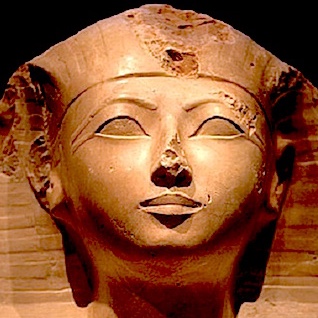 Hatshepsut Hatshepsut"The Queen Elizabeth of Egyptian History" Called by historians "the first great woman in history” and “one of the most powerful women in the history of the world,” Hatshepsut was also one of the most successful and compassionate pharaohs and set the stage for the zenith, the most golden age of Egyptian culture. Credited with the first transplanting of foreign trees, the first use of resin (making a kohl eyeliner), and one of the most prolific builders; she made the tallest surviving ancient obelisk on Earth, buildings not rivaled for a thousand years, and so many statues that almost every major museum in the world includes them. |
| Heinrich Graetz | 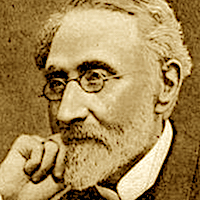 Heinrich Graetz Heinrich GraetzPioneering Jewish historian Although Graetz became the most esteemed 19th century Jewish historian and one of the first to write a major Jewish history from a Jewish perspective, he was sued for libeling the Jewish religion and later accused of heresy. In spite of that, his history became very popular and influential. It was a ground-breaking effort and brought to the world a new interest in Jewish history. Later historians accused him of presenting a too weepy view of this history, an over-emphasis on the tragic suffering, and an ignoring of the more positive and joyful events; however, his deeply difficult and pioneering works remain. |
| Heinrich Heine | 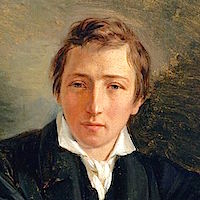 Heinrich Heine Heinrich Heine |